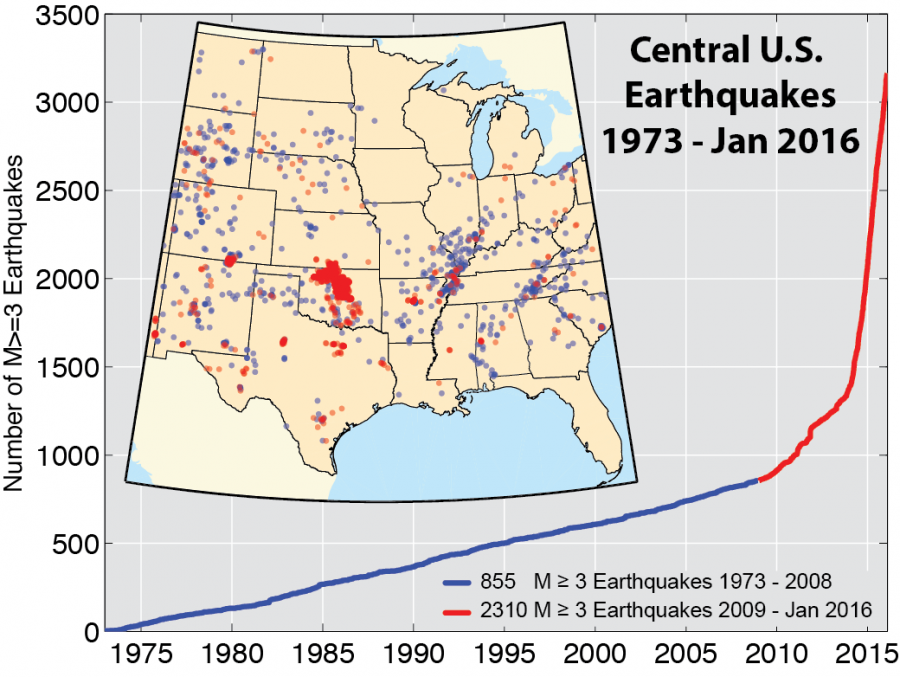The Case Against Fracking
The state of Oklahoma is experiencing what could reasonably be dubbed an earthquake epidemic. Over 3,000 earthquakes have been reported in the state over the past year alone — far more than in California over the same period. They are frequent enough that my cousin, who lives in Oklahoma, has become quite skilled at guessing the magnitude of the earthquakes on the Richter Scale when they occur. This is not the natural geologic state for Oklahoma; its rise in earthquakes has correlated with the increased rate of fracking (a method of natural gas extraction for energy) in the state.
This fact, however, is not enough evidence to convince Gary Sernovitz that fracking poses significant environmental risks. In an op-ed for the New York Times on April 11, 2016, Sernovitz argued that while fracking is opposed by most liberals, it is in itself not antithetical to liberalism and may actually be compatible with the ideology. However, Sernovitz’s argument both cherry picks upsides to fracking and ignores several of its significant drawbacks.
A key component of Sernovitz’s argument is that fracking does not inherently go against the principles of liberalism; therefore, liberals should not oppose it. Perhaps that is true, but that is not a strong enough reason to justify the continued use of fracking without examining its considerable costs. It is also beside the point; a clean and sustainable environment is in everyone’s best interests, not just liberals’.
Sernovitz — who, it is worth noting, works at an investment firm that funds the extraction of fossil fuels — begins by pointing out that reliance on natural gas reduces carbon dioxide (CO2) emissions. This is true, and is admittedly one of the major perks of natural gas; combustion of natural gas releases fewer tons of carbon dioxide into the atmosphere than coal or oil. However, fracking releases an even more dangerous chemical into the atmosphere: methane, which is far more effective at trapping heat in the atmosphere and furthering global warming. More methane in the air also reduces air quality and can cause respiratory issues.
Sernovitz goes on to argue that fracking reduces poverty by providing cheap energy, thereby lowering energy costs. This again overlooks a more significant drawback of fracking. Natural gas extraction is notorious for lowering the quality of life in regions where the extraction takes place. Fracking releases countless dangerous chemicals — among them, benzene, particulate matter and carbon monoxide — that are linked with cancer, nervous disorders and other dire health issues.
Finally, Sernovitz makes the case that natural gas reserves will reduce dependence on foreign oil. But while we do want to reduce foreign dependence, it does not follow that fracking is the solution to this problem. Natural gas is a nonrenewable resource; American reserves are estimated to last about another 100 years, and ramping up fracking to reduce dependency ensures they will be depleted much more quickly than that. Switching to natural gas is akin to using a bandage, and a flimsy one at that.
Meanwhile, Sernovitz is wrong to dismiss concerns about earthquakes, methane leakage and groundwater contamination. The extent of earthquakes in heavily-fracked states is hardly exaggerated, given the staggering numbers in Oklahoma. Even Oklahoma Governor Mary Fallin, a notorious opponent of clean energy regulations, has acknowledged that fracking leads to earthquakes and has identified it as an issue that must be resolved.
Groundwater contamination, despite Sernovitz’s claims, has proven to be a major issue. In northern Pennsylvania, heavy fracking led to significant contamination in wells used for drinking water. More recently, fracking caused groundwater contamination in Wyoming. Sernovitz references an Environmental Protection Agency (EPA) report that states that “[actions related to fracking] have not led to widespread, systemic impacts to drinking water resources in the United States.” But when it comes to safe drinking water, it is not justifiable to ignore a problem just because it does not affect the entire nation; it is unacceptable for these rural areas to not have access to safe drinking water.
In addition, a systematic shift to renewable energy is not nearly as improbable as its detractors claim. We are not stuck with fracking; a large percentage of the United States has the resources and capacity to switch to solar energy, wind energy and other renewable sources. Solar and wind energy are not panaceas, but they are far better solutions than fracking.
Perhaps there is not enough evidence to convince Sernovitz that fracking, by definition, goes against liberalism. There is certainly enough evidence, however, to conclude that fracking is no better than other unsustainable energy sources, and that we should be doing everything we can to move away from it.
Bibliography
https://www.revealnews.org/article/hey-california-oklahoma-had-3-times-as-many-earthquakes-in-2014/
https://twitter.com/ourcarbon/status/661567035713818625/photo/1?ref_src=twsrc%5Etfw
http://energyclub.stanford.edu/perspectives-on-u-s-natural-gas-resources/
http://www.nytimes.com/2016/04/11/opinion/can-liberals-frack.html?_r=0
https://www.hcn.org/articles/new-research-links-fracking-contamination-groundwater-pavillion-wyoming
http://www.scientificamerican.com/article/groundwater-contamination-may-end-the-gas-fracking-boom/
http://www.greenpeace.org/international/en/campaigns/climate-change/energyrevolution/renewable-energy-myths/










